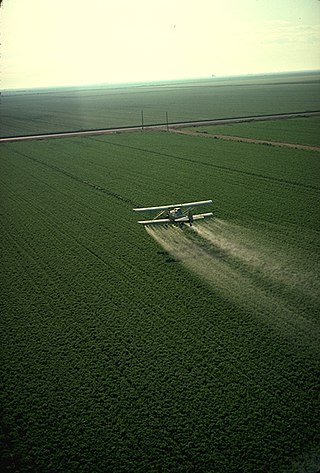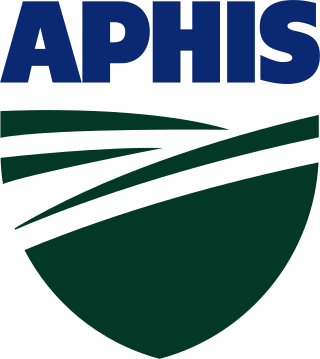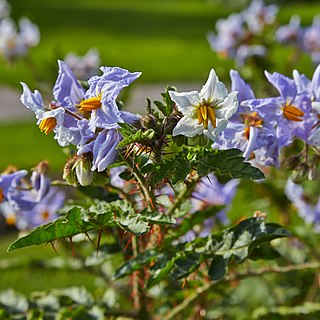Related Research Articles
Biosecurity refers to measures aimed at preventing the introduction and/or spread of harmful organisms intentionally or unintentionally outside their native range and/or within new environments. In agriculture, these measures are aimed at protecting food crops and livestock from pests, invasive species, and other organisms not conducive to the welfare of the human population. The term includes biological threats to people, including those from pandemic diseases and bioterrorism. The definition has sometimes been broadened to embrace other concepts, and it is used for different purposes in different contexts.

Pesticides are substances that are used to control pests. They include herbicides, insecticides, nematicides, fungicides, and many others. The most common of these are herbicides, which account for approximately 50% of all pesticide use globally. Most pesticides are used as plant protection products, which in general protect plants from weeds, fungi, or insects. In general, a pesticide is a chemical or biological agent that deters, incapacitates, kills, or otherwise discourages pests. Target pests can include insects, plant pathogens, weeds, molluscs, birds, mammals, fish, nematodes (roundworms), and microbes that destroy property, cause nuisance, or spread disease, or are disease vectors. Along with these benefits, pesticides also have drawbacks, such as potential toxicity to humans and other species.

The Agricultural Research Service (ARS) is the principal in-house research agency of the United States Department of Agriculture (USDA). ARS is one of four agencies in USDA's Research, Education and Economics mission area. ARS is charged with extending the nation's scientific knowledge and solving agricultural problems through its four national program areas: nutrition, food safety and quality; animal production and protection; natural resources and sustainable agricultural systems; and crop production and protection. ARS research focuses on solving problems affecting Americans every day. The ARS Headquarters is located in the Jamie L. Whitten Building on Independence Avenue in Washington, D.C., and the headquarters staff is located at the George Washington Carver Center (GWCC) in Beltsville, Maryland. For 2018, its budget was $1.2 billion.

Ann Margaret Veneman is an American attorney who served as the fifth executive director of UNICEF from 2005 to 2010. She previously served as the 27th United States secretary of agriculture from 2001 to 2005. Veneman served for the entire first term of President George W. Bush, and she left to take the UNICEF position. Appointed by the U.N. Secretary-General Kofi Annan on January 18, 2005, she took over the post on May 1, 2005. A lawyer, Veneman has practiced law in Washington, DC and California, including being a deputy public defender. She has also served in other high-level positions in both the state and the federal government of the United States, including being appointed secretary of the California Department of Food and Agriculture, serving from 1995 to 1999, as well as United States deputy secretary of agriculture, serving from 1991 to 1993. Throughout her public career, Veneman was the first woman to serve in a number of positions, including secretary of agriculture, deputy secretary of agriculture, and California's secretary of food and agriculture. She was also just the second woman to lead UNICEF, following her predecessor, Carol Bellamy.

The Animal and Plant Health Inspection Service (APHIS) is an agency of the United States Department of Agriculture (USDA) based in Riverdale, Maryland responsible for protecting animal health, animal welfare, and plant health. APHIS is the lead agency for collaboration with other agencies to protect U.S. agriculture from invasive pests and diseases. APHIS's PPQ is the National Plant Protection Organization for the U.S., and the agency's head of veterinary services/veterinary Deputy Administrator is the Chief Veterinary Officer of the United States.
Natural Resources Conservation Service (NRCS), formerly known as the Soil Conservation Service (SCS), is an agency of the United States Department of Agriculture (USDA) that provides technical assistance to farmers and other private landowners and managers.

The International Plant Protection Convention (IPPC) is a 1951 multilateral treaty overseen by the United Nations Food and Agriculture Organization that aims to secure coordinated, effective action to prevent and to control the introduction and spread of pests of plants and plant products. The Convention extends beyond the protection of cultivated plants to the protection of natural flora and plant products. It also takes into consideration both direct and indirect damage by pests, so it includes weeds. IPPC promulgates International Standards for Phytosanitary Measures (ISPMs).

The Under Secretary for Marketing and Regulatory Programs is a high-ranking position within the United States Department of Agriculture that supervises policy development and day-to-day operations of the Animal and Plant Health Inspection Service, the Agricultural Marketing Service, and the Grain Inspection, Packers, and Stockyards Administration. The three agencies were appropriated over $800 million by Congress in fiscal year 2004.

The khapra beetle, also called cabinet beetle, which originated in South Asia, is one of the world's most destructive pests of grain products and seeds. It is considered one of the 100 worst invasive species in the world. Infestations are difficult to control because of the insect's ability to survive without food for long periods, its preference for dry conditions and low-moisture food, and its resistance to many insecticides. There is a federal quarantine restricting the importation of rice into the U.S. from countries with known infestations of the beetle. Khapra beetle infestation can spoil otherwise valuable trade goods and threaten significant economic losses if introduced to a new area. Handling or consuming contaminated grain and seed products can lead to health issues such as skin irritation and gastrointestinal distress.

Solanum sisymbriifolium is commonly known as vila-vila, sticky nightshade, red buffalo-bur, the fire-and-ice plant, litchi tomato, or Morelle de Balbis.
The Smuggling Interdiction and Trade Compliance Program is a component of the United States Department of Agriculture (USDA) Animal and Plant Health Inspection Service (APHIS), Plant Protection and Quarantine (PPQ). The mission of the Smuggling Interdiction and Trade Compliance Program is to detect and prevent the unlawful entry and distribution of prohibited and/or non-compliant products that may harbor exotic plant and animal pests, diseases or invasive species.

The California Department of Food and Agriculture (CDFA) is a cabinet-level agency in the government of California. Established in 1919 by the California State Legislature and signed into law by Governor William Stephens, the Department of Food and Agriculture is responsible for ensuring the state's food safety, the protection of the state's agriculture from invasive species, and promoting the California agricultural industry.
Wildlife Services is the program intended to provide Federal resources to resolve wildlife interactions that threaten public health and safety, as well as agricultural, property, and natural resources. The program is part of the United States Department of Agriculture’s Animal and Plant Health Inspection Service (APHIS).
Sanitary and phytosanitary (SPS) measures are measures to protect humans, animals, and plants from diseases, pests, or contaminants.

Invasive species are a crucial threat to many native habitats and species of the United States and a significant cost to agriculture, forestry, and recreation. An invasive species refers to an organism that is not native to a specific region, this poses significant economic and environmental threats to its new habitat. The term "invasive species" can also refer to feral species or introduced diseases. Some introduced species, such as the dandelion, do not cause significant economic or ecologic damage and are not widely considered as invasive. Economic damages associated with invasive species' effects and control costs are estimated at $120 billion per year.

The Food Safety and Inspection Service (FSIS), an agency of the United States Department of Agriculture (USDA), is the public health regulatory agency responsible for ensuring that United States' commercial supply of meat, poultry, and egg products is safe, wholesome, and correctly labeled and packaged. The FSIS draws its authority from the Federal Meat Inspection Act of 1906, the Poultry Products Inspection Act of 1957 and the Egg Products Inspection Act of 1970.
Biosecurity in the United States is governed by the Bureau of Western Hemisphere Affairs, which is part of the US Department of State. It obtains guidance and advice on specific matters relating to biosecurity from various other government agencies.
Plant Protection and Quarantine (PPQ) is one of six operational program units within the Animal and Plant Health Inspection Service (APHIS) of the United States Department of Agriculture (USDA). The PPQ works to safeguard agriculture and natural resources in the U.S. against the entry, establishment, and spread of animal and plant pests, and noxious weeds in order to help ensure the protection of native flora and an abundant, high-quality, and varied food supply.

Phytosanitary certification verifies phytosanitary worthiness. These certificates are used to attest that consignments meet phytosanitary import requirements and are undertaken by a National Plant Protection Organization (NPPO). Under the Agreement on the Application of Sanitary and Phytosanitary Measures and ISPM, a certificate for export or for re-export can be issued only by a public officer who is technically qualified and duly authorized by an NPPO.

Kevin Shea is an American administrator who served as the acting United States secretary of agriculture from January to February 2021. A career civil servant, he has served as the Administrator of the Animal and Plant Health Inspection Service (APHIS), a division of the United States Department of Agriculture, since June 18, 2013.
References
- ↑ "About". Food and Agriculture Organization of the United Nations.
- ↑ "USDA declares April 2021 Invasive Plant Pest and Disease Awareness Month during the IYPH". International Plant Protection Convention . 2021-04-02. Retrieved 2021-04-13.
- ↑ "USDA Encourages the Public to Protect Plants Against Invasive Pests in April". APHIS (Animal and Plant Health Inspection Service). USDA (United States Department of Agriculture). Archived from the original on 2023-11-13. Retrieved 2021-04-13.
- 1 2 International Year of Plant Health – Final report. UN FAO. 2021-10-13. pp. x+64. doi:10.4060/cb7056en. ISBN 978-92-5-135056-0.
{{cite book}}:|website=ignored (help)